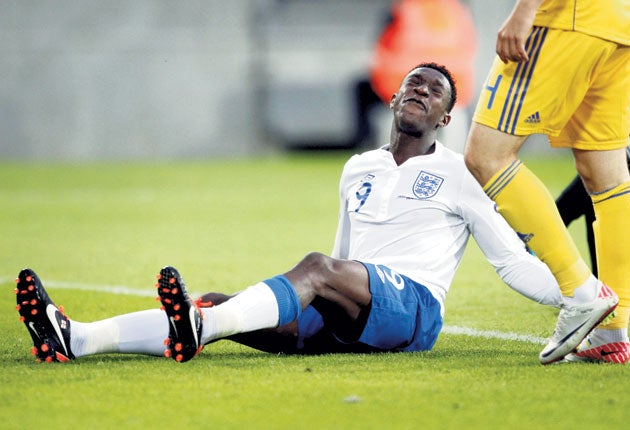Five problems for Pearce to solve if England are to make progress
After two limp draws, the underperforming Under-21s must beat the Czech Republic on Sunday to avoid an embarrassing early exit. Steve Tongue in Herning asks where they can improve

A year ago, Fabio Capello's England were putting the nation's football fans through agonies as they attempted to scramble through what had looked a straightforward qualifying group at the World Cup. After two desultory draws, they needed to win the final match and duly scraped and scrapped past Slovenia. Here in Denmark, the same drama is being acted out in front of rather smaller audiences at the European Under-21 Championship.
Wednesday's goalless draw against Ukraine, following a 1-1 draw with Spain, means that England must defeat the Czech Republic, who are one point ahead of them, in Viborg on Sunday, to maintain Stuart Pearce's record of having reached the semi-final at least in each of his three Under-21 tournaments in charge. However, he must now address some difficult questions.
1. Why have this England team only scored once?
Neither Daniel Sturridge nor Danny Welbeck have been prolific scorers at this level, with eight goals in 27 appearances between them. Although Welbeck's record on loan at Sunderland last season was no better, the hope was that Sturridge would take his new confidence from a profitable spell at Bolton into this tournament.
Together with Phil Jones, he was England's best player against Ukraine, hitting the bar with one fine effort, but there has been no promise of goals from elsewhere in the team. Midfield players have not been arriving in the penalty area and wide men like Danny Rose and Tom Cleverley have carried no scoring threat. Set-pieces, traditionally a heavy source of goals for British teams, have proved to be equally unprofitable.
2. Why couldn't they beat a modest Ukraine side?
The midfield, with new Merseyside rivals Jordan Henderson and Jack Rodwell disappointing, never controlled the game and for the first 30 minutes England were on the back foot. They improved later as Ukraine, who needed to win after losing their first game to the Czechs, made attacking substitutions and pushed on, leaving some gaps at the back. But despite recording 15 scoring attempts, England managed only four on target – three of them by Sturridge and one by Welbeck, who also missed badly when clean through. Once again England had less possession than their opponents, although the gap – 47 per cent to Ukraine's 53 per cent – was less glaring than it was against Spain.
3. Why do England play a long-ball game?
In the build-up to the match Pearce spoke about a country's footballing DNA, suggesting: "We have to learn lessons from other nations to improve us, but never lose sight of the DNA of our nation, and the strengths of our individual players."
He was referring essentially to mental strength, "refusing to throw in the towel" and also physical power and athletic ability. Overall, however, English players tend to be less technically gifted than those of many other countries and when under pressure resort too often to giving the ball a good whack. The problem has been finding the right balance between retaining possession, moving the ball quickly and maintaining a good tempo – incompatible aims if basic technique is lacking. Whatever instructions he is being given, the goalkeeper Frankie Fielding is one of the worst offenders with his kicking, sending endless long balls downfield, often towards Rose, the smallest player in the team.
4. What is the best balance in England's midfield?
The Under-21s normally play what is essentially 4-3-3, which made the use of 4-4-1-1 against Spain a surprise that they were lucky to get away with. The squad, however, lacks a skilful playmaker because of the well documented absence of Arsenal's Jack Wilshere. There are willing runners – Henderson and Rodwell – and defensive midfielders in Fabrice Muamba and Michael Mancienne, the latter having retained his manager's confidence without really justifying it. Mancienne, captain since Micah Richards dropped out injured, admits to not knowing his best position and has been unable to make an unanswerable case for inclusion in any of them. If Muamba, the most experienced player in the squad, was brought in alongside either Rodwell or Henderson, with Aston Villa's Marc Albrighton – who has not played a minute so far – and Scott Sinclair on the flanks, Sturridge could operate in his best position just behind the main striker.
5. Can England really win this tournament?
The Czech Republic looked an outstanding team in reaching the finals, when they won nine games out of 10 and drew the other, but any air of impregnability was dented by Spain, who saw off their physical challenge comprehensively, if painfully, in a 2-0 win; the Czechs were lucky to have only one player suspended for Sunday.
England will be happier facing a physical approach than a more technical one as they did in the same situation at the finals in 2007, defeating a vigorous Serbia team with 10 men after Tom Huddlestone was sent off. The qualities Pearce has stressed will come into play, so with the defence picking itself, he and his coaches need to find that elusive midfield balance to maximise scoring potential and bring the best out of players who have underperformed thus far. If they do, a place in the semi-final, probably against Switzerland on familiar ground at Herning next Wednesday, is perfectly possible.
Join our commenting forum
Join thought-provoking conversations, follow other Independent readers and see their replies
Comments
Bookmark popover
Removed from bookmarks